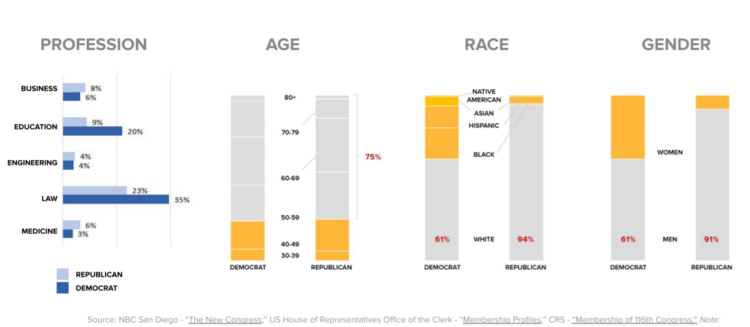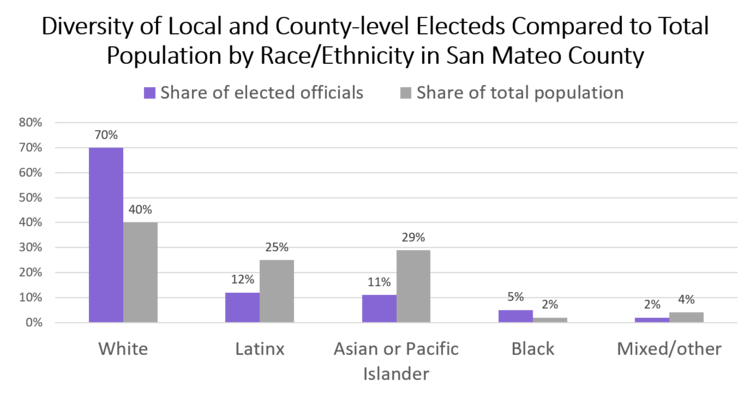With a bachelor’s degree from Stanford, a Juris Doctor from Harvard Law School and stints at the DOJ and private practice, Mondaire Jones has a platinum-plated resume that you’d think would make him a shoo-in for Congress. But Jones told the New York Times, “Growing up poor, Black, and gay, I never imagined someone like me could run for Congress, let alone win.”
Jones won New York's 17th Congressional District, 2020 Democratic Primary this July with nearly 45% of the votes and will most likely be the first openly gay, African-American member of U.S. Congress.
Candidate “firsts” like Jones will be joined by other potential firsts.
Candace Valenzuela would be the first Afro-Latina elected in Congress from Texas
Joshua Collins would be the first openly autistic member of Congress from Washington
46 women filed as Republicans to run for congressional seats this year, a 73% jump over 2018
While this focus on “firsts” is a step in the right direction to increase diversity in national and local government, we are a long way from aligning the demographic and professional backgrounds of our elected officials with the communities they represent.
Giving voters more options at the ballot box is more important than ever, with so much social, political and economic upheaval. The Social Impact Advisory Group asked experts in the field how best to achieve a more diverse political candidate pipeline.
Lack of Diversity in our Political Representation
Data[1] shows that our national political representatives are disproportionately White and male. Specifically
-
89% of US elected officials are White, despite the only 63% of the US population is White and
-
75% of members of Congress are men.
This imbalance is not only demographic in nature, but professional as well with 30% of Congress coming from legal careers. “Lack of diversity in our political institutions has significant policy implications,” says Mairin Macaluso of Leadership Now Project, a nonprofit membership organization with a mission to protect American democracy. A real-world example of this would be the effects of COVID-19 among African-Americans and Latinx, who are three times more likely to contract the virus and two times more likely to die from the virus. This imbalance suggests Black, Indigenous and People of Color, who are underrepresented in both local and national office, may not see their needs met through policy when it comes to containing the virus.

She Was Asked to Run
1992 was a troubling time for East Palo Alto, CA, a young city struggling with significant social and economic crises. Good leadership at the local level would be an imperative. Rose Jacobs Gibson was part of a committee formed at the time to identify strong candidates to run for the East Palo Alto City Council. It was through that committee that Jacobs Gibson was chosen to run. “So I was hosting this meeting at my house, believe it or not, and yet I was informed before the meeting that we weren’t going to be talking about a list of people, but were going to be focusing on why they wanted me to seek office.”
Jacobs Gibson, who is Black, never considered running for office before, but became inspired when others saw her as a qualified candidate. “When we want to recruit from diverse communities, we have to go to those communities...We need find ways of getting to know them so they’ll make that extra effort to sacrifice their time…We can’t expect that if we extend the invitation for them to serve, they’ll just show up.”

Who Gets to Decide Who’s Electable?
Formerly a staffer for elected officials, Nicole Fernandez learned early that the idea of who is electable is determined by powerful voices within the system. “There are king and queen makers … who can make or break your campaign…And while it’s important that we have qualified candidates who understand the system and care enough to make a difference, it’s also important that those king and queen makers change their views on what constitutes someone who is electable,” says Fernandez, Chair, San Mateo County Democrats.
Macaluso of Leadership Now demonstrated this challenge with an example from the 2018 midterm elections. When identifying Congressional seats to flip, the Democratic Congressional Campaign Committee initially included only White candidates to actively endorse. After several Black leaders intervened to understand why Black candidates were completely overlooked, two new candidates were identified: Lauren Underwood, a nurse who had served in the Department of Health and Human Services and Colin Allred, a civil rights attorney with experience in both HUD and as a linebacker in the NFL. Both won in their general elections, with Underwood now representing Illinois’s 14th district and Allred, Texas’s 32nd district.
Leadership Now Project addresses this imbalance at the national level by identifying high quality yet overlooked candidates to run for office at the national level. Still new candidates need significant financial backing to garner sponsorship from political powerbrokers. Says Macaluso, “If you raise less money, you’re not on the radar with the powers that be and with the rating agencies.”
Valerie McGinty is President and Founder of Fund Her, a political action committee providing financial support to female political candidates, over 50% of whom are women of color or come from the LGTBQ+ community. McGinty agrees people don’t typically decide on their own to run without encouragement. This is particularly challenging when the profile of who is “electable” is so firm in people’s minds, even for those who have the experience and character to be effective political leaders. “I’ve had the chance see so many fabulous female candidates … and watching how easily these women candidates—particularly women of color—were dismissed. It gets back to this idea of ‘I could be electable if you thought I was.’ And that’s the vision of Fund Her… the ability to say ‘Yes, we do believe in you.’”
Get Involved Now
The most successful candidates have an understanding of how political institutions work before they put their hat in the ring. Fernandez of San Mateo County Democrats said, “… nothing changes unless you have a seat at the table. And the only way you get a seat at the table is by understanding the system and getting involved with the system.”
Today Jacobs Gibson is President and CEO of ILEAD, a nonprofit providing civic engagement training opportunities for youth, adults and families. From her time in office, Jacobs Gibson became a big believer in expanding the number of government commissions and ensuring demographic and professional diversity to allow more people to be involved with their community. The strategy paid off while she was in office. “When there were opportunities of any campaigns, we already had people who were on the ground working with us and supporting us.”
Our experts encouraged those in underrepresented groups to get involved now and year-round, if you want to see change. And when you do get involved, speak up. “Your voice is important… Remember, you are representing thousands of people who didn’t get that seat at the table,” said Fernandez.
Related: Words Matter: How the Lexicon of Financing Hinders Minority and Women Entrepreneurs
[1] Source: NBC San Diego – “The New Congress”: US House of Representatives Office of the Clerk – “Membership Profiles” CRS – “Membership of the 116th Congress.”

